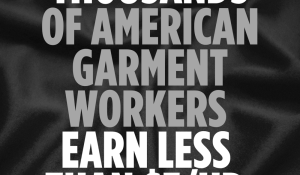
Marie Angel Hoole moved to California happily in 2015. Her fiancée was about to start school in Los Angeles. Hoole had a bachelor’s degree and years of experience in the restaurant business, from service to management, and good references. She felt confident she would find a job and the couple’s new life in California would be better than it was in Texas.
She didn’t find work easily. As a transgender woman, Hoole had dealt with discrimination before, and she was not the only one to face that struggle. The US unemployment rate is three times for trans people what it is for the rest of the population—four times for trans women of color. The 2015 US Transgender Survey from the Center for Transgender Equality reported that 27 percent of trans people who had applied to or worked at a job in 2015 had been fired, denied a promotion, or not hired because of their gender identity or expression.
As the Green American goes to print, there are rumblings out of Washington that the president may soon sign an executive order on “religious liberty,” which could allow companies to fire employees for not adhering to the boss’s interpretation of religion. That could mean that some LGBTQ people will be out of work because their very existence is “against” someone’s religion. Such an executive order would likely make it even more difficult for transgender people to find good jobs.
Businesses and programs are stepping up to close this gap. Advocates see the trans community as a huge untapped and highly educated workforce, in part since trans people are twice as likely to hold a bachelor’s degree or higher than the general population. With poverty and suicide rates significantly higher for trans people than for the general population, it’s especially important for them to find meaningful work. Therefore, the trans community and allies are calling for economic justice: hiring practices that fairly reflect ability and potential instead of fear or stereotypes.
The US unemployment rate is three times for trans people what it is for the rest of the population—four times for trans women of color.
Journey To A Job
Back in Texas, Hoole had been pressured by employers not to express her gender identity, or had been denied jobs outright because she was trans. She had heard good things about California’s treatment of trans people—it’s one of only 19 states that has legal protections based on gender identity. But even once she arrived in her new state, she still had a hard time moving from applying for jobs to being hired.
“I have a strong resume, and I’m an educated person. And yet, that didn’t seem enough,” she says. “I came to know that Texas wasn’t the only place that needed help in getting the population to understand what the issues are. Laws are not going to change people alone. We have to change our hearts.”
Years before, in the Los Angeles area, Michaela Mendelsohn was having similar thoughts. Mendelsohn is a franchise owner of six locations of the fast food chain El Pollo Loco in Southern California. She’s also the first trans woman to serve on the board of The Trevor Project, a suicide prevention organization for LGBTQ youth. She was volunteering for the Project’s crisis hotline when she had an idea.
“As I was taking calls and helping youth in desperate need, I realized we’re giving them tremendous help. We’re de-escalating the suicidal risk behavior at that moment, and we’re giving them safety plans and resources to improve their lives, and we’re there for follow-up calls,” she says. “But to truly improve their lives on a more permanent basis, there have to be employment opportunities. And here I was, an employer with a possibility to do that in my businesses.”
Opportunities for Open Hearts
Though she bought her first franchise in 1988, Mendelsohn didn’t hire her first trans employee until 2012 after her “a-ha” moment at the Trevor Project. She was pleased by the performance of the employee and the positive response from customers. She kept hiring trans people, and the positive impact grew for her business.
In 2016, Mendelsohn started California Trans Can Work (CTCW), which creates trans-positive restaurant-industry workplaces in California by training management and mentoring trans employees. The program was modeled on the success of the employees in her own restaurants.
“This is a huge pool of employees that we can’t afford to not consider,” says Mendelsohn. According to a 2016 survey from the Williams Institute at UCLA, 218,000 transgender adults live in California, or 15 percent of the US trans population.
“And diversity is just good for business,” she adds. “I think almost all of the Fortune 500 companies have realized that and are on board as well.” Mendelsohn says that since the program has been testing at El Pollo Loco for four years, the next step has been placing transgender job-seekers with a “close-knit” community of employers, including several Dunkin’ Donuts locations in the L.A. area. The next phase, which she says will launch in April, will offer the program in a “much broader range” of restaurants.
Good For Employees & Customers
Mendelsohn’s claim that Fortune 500 companies are recognizing the value of diversity may be true. Every year the Human Rights Campaign publishes the Corporate Equality Index, to see how well Fortune 500 and other large US companies translate that value into LGBTQ-inclusive policies, benefits, and practices. Its 2017 edition rated 1,043 companies, and 49 percent of companies earned a perfect score. In 2002, the first year the index was published, only 4 percent had earned a perfect score. [Editor’s note: Thanks to the pressure socially responsible investors regularly put on large corporations, 89 percent of Fortune 500 companies now prohibit discrimination based on sexual orientation, and 66 percent based on gender identity as well.]
Recruiting and hiring trans employees may also be good for a company’s bottom line. Mendelsohn says she hears more compliments on her employees who are part of the program than on ones outside of it. She also notes that 30 percent of her trans employees move to management positions, which is a much higher rate than standard in the industry or in her stores in general.
"We’re de-escalating the suicidal risk behavior at that moment, and we’re giving them safety plans and resources to improve their lives... But to truly improve their lives on a more permanent basis, there have to be employment opportunities."
Because of the program, customers are meeting trans people in friendly interactions in their communities, which is “opening people’s hearts,” Mendelsohn says. “They may never have met or realized they had met a transgender person before. The customers are really loving it. And making our customers happy is, of course, one of the most important things.”
The most direct benefit, however, is to the employees. In 2016, Mendelsohn hired Marie Hoole as a cashier at El Pollo Loco through CTCW. And because of her natural leadership tendencies, Mendelsohn also hired Hoole last fall to be a paid trans-visibility advocate with CTCW. As such, Hoole talks to restaurant owners who might be interested in adopting the program about its positive impacts.
“The work that CTCW does has changed my life tremendously,” says Hoole. “It has provided me with a leveled playing field, where I got the chance to show my skills and be appreciated for my hard work. The opportunities [have been] life-changing, and they have made of me a happier Marie. The organization gave me something I really never had, and that is simply to succeed in my own true identity—and so it has for so many others. This is a reality I want the world to know and share.”
Building Economic Justice
The restaurant industry isn’t the only industry in California that’s recruiting transgender employees. As the director of economic development at the San Francisco LGBT Center, Clair Farley works on the Center’s Transgender Employment Program, which was the first of its kind when it was founded in 2007. The program provides job training and placement services to trans people in the Bay Area, as well as connections for businesses looking to hire from that diverse pool. It also is a resource for other organizations that want to set up similar programs.
Unlike the CTCW, the Trans Employment Program is not affiliated with one industry. The website boasts job placement successes in fields from health care to nonprofit leadership and the tech industry. The Transgender Employment Program works in an advisory role to the CTCW, and Farley says she hopes it can help connect the CTCW with hospitality-sector businesses and people as the program grows.
Because of her role at the LGBT Center, Farley has been approached by organizers trying to set up hiring programs in other cities in California, and places as far away as Hawaii and DC.
“We’re looking at how we can continue to support this kind of work across the country, because we feel, a lot of the time, LGBT funding in general ignores economic development or economic justice,” Farley says. “Building self-sufficiency is key to getting folks out of oppression and advocating for themselves and growing their support systems.” Farley says that the work is not done by getting individuals into jobs, though it is a start. The Center’s economic development department is also working with potential employees on job skills training and asset management, and working with employers to add diversity and inclusion to hiring practices.
A Green Economy is Inclusive
A green economy means one in which all people have equal opportunity to do meaningful work for a living wage, in safety and without exploitation. Going the extra mile to lift up trans workers helps level the playing field.
“Many gender non-conforming people are out there right now looking a for a job and are facing discrimination and/or are victims of unfair and unsafe treatment in their workplace, because of their gender identity—especially among people of color. This needs to stop,” says Marie Hoole. “Trans-visibility can change cultural barriers and misconceptions in the workplace about transgender employees. The proactive change we encourage employers to take advantage of creates opportunity and begins with education. There is such a lovely feeling to finally enter the doors of my workplace as Marie, and that’s a title I am most proud of.”








